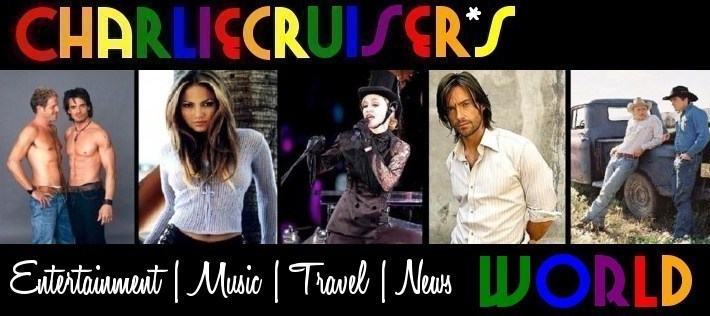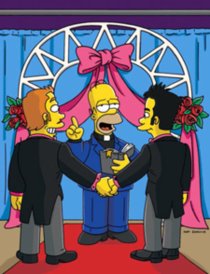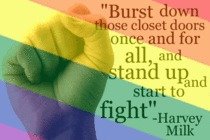 I've come by on Monday—the pastor's Saturday—to spend my last day in Colorado Springs with Gayle and Ted. Gayle, a pretty 53-year-old with chin-length brown hair, wearing a dark cardigan and pressed slacks, greets me warmly at the door. "Good morning! Sorry it took us a little while," she says, tucking a stray hair behind her ear. "I just wanted to be dressed before you came."
I've come by on Monday—the pastor's Saturday—to spend my last day in Colorado Springs with Gayle and Ted. Gayle, a pretty 53-year-old with chin-length brown hair, wearing a dark cardigan and pressed slacks, greets me warmly at the door. "Good morning! Sorry it took us a little while," she says, tucking a stray hair behind her ear. "I just wanted to be dressed before you came."
"I didn't, and I don't care," says Ted, smiling beside her in an undershirt and red pajama pants.
Gayle pours coffee while Ted shows me the house: two-car garage, in-ground pool and hot tub, backyard trampoline, Ten Commandments light fixtures. Their bookshelves hold an encyclopedia set, some political memoirs, a few Dan Brown novels, copies of Ted's books, and several old family portraits that look like outtakes from an L.L.Bean catalog. Christy, their only daughter and, at 29, the eldest of the five children, is in the den finishing a paper for a writing class. New Life Church, nine-tenths of a mile away, is visible through the north-facing windows if you squint hard enough.
As Gayle and I sit down on the living room sofa and Ted moves his laptop off the recliner next to us, I mention that I'd visited New Life the day before, touring its $50 million campus with the church's media escort.
"See, that's typical," says Ted. "They'll do that. That's typical of the old Soviet Union."
"Wait till you see the Gulag," Gayle deadpans.
"Now, at St. James, I didn't care who you talked to," Ted says, leaning back in his chair. "If we were into image management, we wouldn't have let you talk to Guy. But my philosophy is: It is what it is. It just is what it is.
"Actually!" he exclaims. "I just finished reading my Bible before you came. A fella texted me a tremendous verse, and I read it to Gayle, and I said, 'I should start saying this at New Life.' "
"You mean St. James."
"I mean St. James."
"You do that all the time."
"Anyway, I'm reading Romans. I just finished with Matthew, which is all Jesus, so I thought I'd harden that up with some Paul. Because Jesus is way too redeeming. He likes everyone but religious people."
Gayle, who has always been more careful around reporters than Ted, heard that he was in one of his moods up in the mountains, and she's worried that I'm going to write that he's a manic-depressive loon. I assure her that I'm not.
"Oh, good," she says, sounding genuinely relieved. "I know how he can get."
They met at Oral Roberts, and they have the rapport of a couple who have been married their entire adult lives. It's difficult to imagine that just four years ago, Gayle looked on with revulsion as Ted gathered his children in this very living room and told them that he'd been living a double life.
Gayle wrote about this time in Why I Stayed: The Choices I Made in My Darkest Hour, her 2010 memoir, copies of which are stacked in cardboard boxes in the dining room. In explaining her loyalty to Ted, Gayle tried to show that she's not, in fact, a subservient pushover, that she might actually be a lot braver and more principled than most. "If I left Ted," she wrote, "my life would be illustrating that some people mess up too badly to be redeemed... . And I don't believe that. I don't believe in throwing people away because they've sinned, because all people are valuable and loved by God."
What Gayle's book didn't do was settle the question of Ted's sexuality or give insight into how it plays out in their marriage now—whether Ted still battles the same urges that got him to Mike Jones's massage table. And if so, does he tell her when it happens? Does she worry that he'll lapse again or that after everything they've been through, he'll pull a Jim McGreevey and leave her for a man?
When Gayle leaves to pick up lunch from a nearby Italian joint, I mention that I visited Mike Jones in Denver. Ted tenses and preemptively begins debunking Jones's claims again—no sex, no repeat massages, no kinky stuff. He admits that he bought drugs from Jones "five or six times" but maintains that he wasn't an addict.
"Sometimes I'd throw it away," he says. "Other times, I'd go someplace and masturbate and use it. But it was for masturbation. And that's one of the reasons why I haven't been real clear. I don't want to stand up publicly and say, 'Hey, I'm a masturbation guy!'
"You know, that's really the core issue here," he continues, lowering his voice. "I bought the drugs to enhance masturbation. Because what crystal meth does—Mike taught me this—crystal meth makes it so you don't ejaculate soon. So you can watch porn and masturbate for a long time."
"And it would be gay porn?" I ask.
"It would be both. I enjoyed both then."
"Do you watch porn anymore?"
"Now we're getting into what should happen between me, my wife, and my therapist."
For the first time since we've met, Ted isn't looking directly at me. "Here's where I really am on this issue," he half whispers. "I think that probably, if I were 21 in this society, I would identify myself as a bisexual." After a weekend of Ted trying to convince me of his unambiguous devotion to his wife and kids, I'm at first too surprised to say anything.
"So why not now?" I ask finally.
"Because, Kevin, I'm 54, with children, with a belief system, and I can have enforced boundaries in my life. Just like you're a heterosexual but you don't have sex with every woman that you're attracted to, so I can be who I am and exclusively have sex with my wife and be perfectly satisfied."
"But what does it have to do with being 54?"
"Life!" he says. "We live an ordinary life."
It's the most intimate exchange we've had, and the confession strikes me first as sad, then as nakedly honest, the kind of thing I kept wishing he would say to Oprah or Larry King or any of the other people who have demanded explanations of his muddled sexuality. In a way, hearing Ted talk about his self-imposed boundaries makes it easier to understand how he can seem so fulfilled with his new, cleaned-up life. These days what Ted craves is not total sexual satisfaction but exactly the things he used to have—a church, a loving wife, camping trips with his boys—and getting those things back will require amputating part of who he is and what he might, at some point, have wanted.
A few minutes later, Gayle walks back into the house with an armful of food.
"Lunch is served!"
"You're wonderful!" Ted says, rising from his recliner to help. From the couch, I can hear their voices peal through the house.
"Do you want me to mix the dressing in or just leave it on the side?"
"Oh, go ahead and mix it in."
At the table, we bow our heads as Gayle says grace: "Father, thank you for today. We pray for your blessings on all of this, and for your wisdom, knowledge, and understanding. In Jesus' name, amen."
I look up to see Ted gazing at Gayle, the corners of his mouth pressed into a slight smile. He hadn't bowed his head at all.
 Natalie Portman, Colin Firth and the cast of The King's Speech took the top prizes at the 2011 Screen Actors Guild Awards on Sunday.
Natalie Portman, Colin Firth and the cast of The King's Speech took the top prizes at the 2011 Screen Actors Guild Awards on Sunday.



 I've come by on Monday—the pastor's Saturday—to spend my last day in Colorado Springs with Gayle and Ted. Gayle, a pretty 53-year-old with chin-length brown hair, wearing a dark cardigan and pressed slacks, greets me warmly at the door. "Good morning! Sorry it took us a little while," she says, tucking a stray hair behind her ear. "I just wanted to be dressed before you came."
I've come by on Monday—the pastor's Saturday—to spend my last day in Colorado Springs with Gayle and Ted. Gayle, a pretty 53-year-old with chin-length brown hair, wearing a dark cardigan and pressed slacks, greets me warmly at the door. "Good morning! Sorry it took us a little while," she says, tucking a stray hair behind her ear. "I just wanted to be dressed before you came."

























